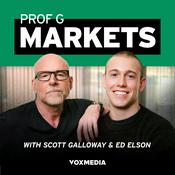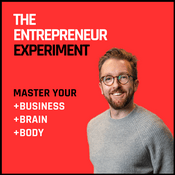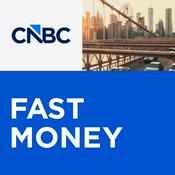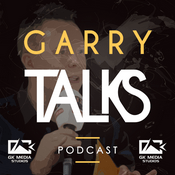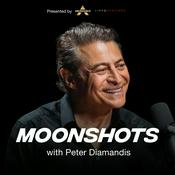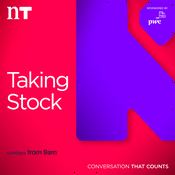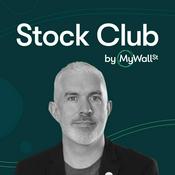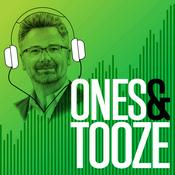166 episodes
Building Meter for decades, not an exit | Anil Varanasi (Co-founder and CEO)
10/12/2025 | 1h 14 mins.Anil Varanasi is the co-founder and CEO of Meter, which provides full-stack networking infrastructure as a service for businesses. Since founding Meter with his brother Sunil in 2015, Anil has been playing a distinctly long game in one of the most entrenched markets in technology, betting on vertical integration, business model innovation, and a multi-decade time horizon. In this conversation, he unpacks Meter’s origin story, from four-plus years of heads-down R&D, and shares how his unconventional approach to planning, management, and pace keeps him excited to run the company for decades.
In today’s episode, we discuss:
Why Anil thinks in 25-year horizons
How operating in a monopolistic market shaped Meter’s approach
Why Meter scrapped a year of OS work during the R&D phase
How Meter is rethinking networking’s business model
Surviving COVID, Apple’s M1 transition, and “a thousand bad days”
Anil’s contrarian views on planning, OKRs, and management
How founders can build companies they’ll want to run for decades
Where to find Anil:
LinkedIn: https://www.linkedin.com/in/anilcv/
Twitter/X: https://x.com/acv
Where to find Brett:
LinkedIn: https://www.linkedin.com/in/brett-berson-9986094/
Twitter/X: https://twitter.com/brettberson
Where to find First Round Capital:
Website: https://firstround.com/
First Round Review: https://review.firstround.com/
Twitter/X: https://twitter.com/firstround
YouTube: https://www.youtube.com/@FirstRoundCapital
This podcast on all platforms: https://review.firstround.com/podcast
References:
ADT: https://www.adt.com
Alex Honnold: https://www.alexhonnold.com
Alex Tabarrok: https://x.com/ATabarrok
alarm.com: https://www.alarm.com
Andreessen Horowitz (a16z): https://a16z.com
Apple: https://www.apple.com
Bloomberg: https://www.bloomberg.com
Bryan Caplan: http://www.bcaplan.com/
Cisco: https://www.cisco.com
Coca-Cola: https://www.coca-colacompany.com
George Mason University (GMU): https://www.gmu.edu
Intel: https://www.intel.com
Julia Galef: https://x.com/juliagalef
Martin Casado: https://www.linkedin.com/in/martincasado/
Meraki: https://meraki.cisco.com
Meter: https://www.meter.com
Michela Giorcelli: https://x.com/M_Giorcelli
Nicholas Bloom: https://www.linkedin.com/in/nick-bloom-stanford/
Raffaella Sadun: https://www.linkedin.com/in/raffaella-sadun-3a182225/
Sanjit Biswas: https://www.linkedin.com/in/sanjitbiswas/
Sunil Varanasi: https://www.linkedin.com/in/sunil-varanasi-662a01253/
Tyler Cowen: https://www.linkedin.com/in/tyler-cowen-166718/
Twitch: https://www.twitch.tv
Timestamps:
(01:27) Meter’s unusual timeframes
(04:06) “We don’t do OKRs”
(06:32) How to plan without planning
(08:31) Track your unhappy customers
(11:43) How Meter’s journey began
(15:02) Dissecting the 2010s SaaS boom
(17:06) The networking industry trap
(21:44) Meter’s first roadblock
(22:07) Why Shenzhen accelerated Meter’s progress
(26:29) The process to get a sales-ready product
(31:02) Why you should own the full stack
(32:45) The surprising thing you should innovate
(35:03) Avoiding the one-trick pony trap
(37:39) The secret to finding an excellent market
(43:48) How COVID’s constraints propelled growth
(48:25) Why founders need to know their customers
(49:34) Why Meter didn’t sell via traditional channels
(51:44) You need “seller-market fit”
(54:51) The danger of meta-work
(56:25) Decoupling management from authority
(1:02:17) When the person is the problem
(1:05:05) The inherent value of going slowly
(1:09:41) Running a company for as long as possibleHow Harness runs 16 “startups within a startup” at scale | Jyoti Bansal (Co-founder and CEO)
19/11/2025 | 1h 5 mins.Jyoti Bansal is the co-founder and CEO of Harness, the software delivery platform used by thousands of engineering teams, and previously founded AppDynamics, which he led from inception to a multibillion-dollar acquisition by Cisco. In this episode, Jyoti unpacks what it really takes to move from mid-market to enterprise, why he thinks in terms of “product-market-sales fit,” and how he structures Harness as a collection of “startups within a startup” to launch multiple “best-of-breed” products.
In today’s episode, we discuss:
Why companies get stuck in the mid-market and struggle to move up into enterprise
Why Jyoti deliberately lost Netflix as their customer
The difference between product-market-sales fit, and product-market-fit
How to build a scalable, capacity-driven go-to-market machine (instead of chasing deals)
Diagnosing whether you have a product problem or a distribution problem
How to hire and evaluate your first head of sales and top sales leaders
Why Jyoti sold AppDynamics three days before IPO
The “binary differentiator” rule for launching new products into crowded markets
Why Harness runs 16 product lines under one roof
Where to find Jyoti:
LinkedIn: https://www.linkedin.com/in/jyotibansal/
Twitter/X: https://x.com/jyotibansalsf
Where to find Brett:
LinkedIn: https://www.linkedin.com/in/brett-berson-9986094/
Twitter/X: https://twitter.com/brettberson
Where to find First Round Capital:
Website: https://firstround.com/
First Round Review: https://review.firstround.com/
Twitter/X: https://twitter.com/firstround
YouTube: https://www.youtube.com/@FirstRoundCapital
This podcast on all platforms: https://review.firstround.com/podcast
References:
Amazon: https://www.amazon.com/
AppDynamics: https://www.appdynamics.com/
Barclays: https://home.barclays/
BIG Labs: https://www.biglabs.com/
Carlos Delatorre: https://www.linkedin.com/in/cadelatorre/
Charles Schwab: https://www.schwab.com/
Cisco: https://www.cisco.com/
Citi: https://www.citi.com/
Cloudability: https://www.apptio.com/products/cloudability/
Datadog: https://www.datadoghq.com/
Dynatrace: https://www.dynatrace.com/
Harness: https://www.harness.io/
Jeff Bezos: https://x.com/JeffBezos
Microsoft: https://www.microsoft.com/
Nasdaq: https://www.nasdaq.com/
Netflix: https://www.netflix.com/
New Relic: https://newrelic.com/
Salesforce: https://www.salesforce.com/
Splunk: https://www.splunk.com/
Traceable: https://www.traceable.ai/
Unusual Ventures: https://www.unusual.vc/
VMware: https://www.vmware.com/
Timestamps:
(01:48) Why do companies get stuck in the mid-market?
(05:09) Designing a product for enterprise and mid-market
(07:19) Why Jyoti lost Netflix as a customer - on purpose
(10:18) Becoming a scalable GTM organization
(12:32) The real signs of product-market fit
(14:04) Have you delivered the value?
(15:46) How to hire your first sales team
(19:59) The four signs of excellent sales leaders
(23:16) How to interview a sales leader
(27:51) Where Jyoti developed his commercial taste
(29:37) Why early founders need to learn sales
(32:02) How AppDynamics began
(36:36) Why Jyoti sold three days pre-IPO
(41:55) What does a healthy board look like?
(44:23) How Jyoti perceives competition
(46:18) Why you need a binary differentiator
(49:53) How to launch multiple products
(52:00) “We need to be best of breed”
(57:38) Why PMs are like mini-entrepreneurs
(1:00:20) The startup within a startup
(1:02:45) A culture of continuous improvementHow to build a company you’ll run forever | Zack Kanter (Founder and CEO of Stedi)
06/11/2025 | 1h 24 mins.Zack Kanter is the founder and CEO of Stedi, an API-first healthcare clearinghouse. After bootstrapping a wildly profitable auto-parts business, he sold it to tackle "the most complicated problem" he'd ever encountered: business-to-business transaction exchange. He spent years building EDI infrastructure, threw away the entire codebase eight times, and found extraordinary traction in healthcare. Stedi recently raised a $70M Series B co-led by Stripe and Addition. In this conversation, Brett and Zack discuss why venture capital means "going pro," why execution is never actually a moat, and how "eating glass" became Stedi's competitive advantage.
In today’s episode, we discuss:
How 16-year-old Zack turned $2,500 into a wholesale empire
Why bootstrapping means being "constrained by capital" and how VC removes that ceiling
Why Zack rebuilt their EDI product eight times before launch
The snake swallowing a deer: what extreme product-market fit really looks like
What software companies can learn from discount retail and Toyota
Why Stedi’s new hires are told "everything’s your fault now"
And much more
Where to find Zack:
LinkedIn: https://www.linkedin.com/in/zkanter
Twitter/X: https://x.com/zackkanter
Where to find Brett:
LinkedIn: https://www.linkedin.com/in/brett-berson-9986094/
Twitter/X: https://twitter.com/brettberson
Where to find First Round Capital:
Website: https://firstround.com/
First Round Review: https://review.firstround.com/
Twitter/X: https://twitter.com/firstround
YouTube: https://www.youtube.com/@FirstRoundCapital
This podcast on all platforms: https://review.firstround.com/podcast
References:
Aetna: https://www.aetna.com/
Amazon: https://www.amazon.com/
AWS: https://aws.amazon.com/
Blue Cross Blue Shield: https://www.bcbs.com/
Change Healthcare: https://www.changehealthcare.com/
Cigna: https://www.cigna.com/
Clay: https://www.clay.com/
Costco: https://www.costco.com/
Ford Motor Company: https://www.ford.com/
GM: https://www.gm.com/
HIPAA overview (HHS): https://www.hhs.gov/hipaa/index.html
Jeff Bezos: https://x.com/JeffBezos
Kanban / TPS (Toyota): https://global.toyota/en/company/vision-and-philosophy/production-system
Microsoft Teams: https://www.microsoft.com/microsoft-teams
NetSuite: https://www.netsuite.com/
O’Reilly Auto Parts: https://www.oreillyauto.com/
Peter Thiel: https://x.com/peterthiel
Porter’s five forces: https://www.isc.hbs.edu/strategy/pages/the-five-forces.aspx
"Reality has a surprising amount of detail": https://johnsalvatier.org/blog/2017/reality-has-a-surprising-amount-of-detail
Slack: https://slack.com/
Stedi: https://www.stedi.com/
Summit Racing: https://www.summitracing.com/
Target: https://www.target.com/
Walmart: https://www.walmart.com/
Zapier: https://zapier.com/
Timestamps:
(01:24) Zack’s first business
(08:54) Why the first customer is tricky
(10:12) The downside of bootstrapping
(11:42) Why venture capital is like “going pro”
(14:20) The confusion between ownership vs. control
(16:08) Building a company you don’t want to leave
(20:46) Do things better than other people
(24:49) Stedi’s early years
(31:43) Physical vs. digital product-market fit
(34:41) How Stedi scaled decision-making
(40:08) Stedi’s journey to product-market fit
(45:22) Finding founder-approach fit
(50:42) “All software is a cascade of miracles”
(52:52) The surprising lessons from discount retail
(57:50) How the Toyota production system influences software
(1:01:31) What it means to be a high-agency person
(1:03:09) The core trait Zack looks for when hiring
(1:02:57) Maintaining conviction in unconventional practice
(1:14:19) When should you start to hire managers?
(1:17:42) “Reality has a surprising amount of detail”Go hard early: How lessons from Verkada shaped Serval's AI agents for IT teams | Jake Stauch (Founder and CEO)
23/10/2025 | 1h 23 mins.Jake is the founder and CEO of Serval, an AI-driven IT automation and service management platform that just raised $47M in Series A funding this week. Before founding Serval, Jake spent over five years at Verkada, where he led multiple products from 0-1 and helped scale the company across hardware and software. His years at Verkada taught him that winning in enterprise means delivering consumer-quality experiences to business buyers — a lesson that shapes how Serval turns complex IT automation into something that feels magical.
In this episode, Jake and Brett dive into the lessons from Verkada that inspired Serval's founding, what it takes to disrupt entrenched enterprise categories, and practical tips for getting deeply embedded with customers and hiring high-quality candidates.
In today’s episode, we discuss:
Why building “in existing categories” can be more powerful than creating new ones
The lessons from Verkada that shaped Serval's platform strategy
The customer interview question that unlocked the IT buyer’s hidden pain points
How Serval's automation builder uses AI to generate code-based workflows
Redefining engineering and PM roles with forward-deployed engineers
Keeping the hiring bar high in an AI-native startup
Why there’s a “land grab” moment right now in enterprise AI
And much more...
Where to find Jake:
LinkedIn: https://www.linkedin.com/in/jakestauch/
Twitter/X: https://x.com/jakeserval
Where to find Brett:
LinkedIn: https://www.linkedin.com/in/brett-berson-9986094/
Twitter/X: https://twitter.com/brettberson
Where to find First Round Capital:
Website: https://firstround.com/
First Round Review: https://review.firstround.com/
Twitter/X: https://twitter.com/firstround
YouTube: https://www.youtube.com/@FirstRoundCapital
This podcast on all platforms: https://review.firstround.com/podcast
References:
Alex McLeod: https://www.linkedin.com/in/alexmcleodio/
Clay: https://www.clay.com
Cloudflare: https://www.cloudflare.com
Cursor: https://cursor.sh
Filip Kaliszan: https://www.linkedin.com/in/kaliszan/
Hans Robertson: https://www.linkedin.com/in/hansrobertson
Linear: https://linear.app
Okta: https://www.okta.com
Rippling: https://www.rippling.com
Serval: https://www.serval.com/
ServiceNow: https://www.servicenow.com
Verkada: https://www.verkada.com
Workday: https://www.workday.com
Timestamps:
(02:25) Lessons from holding different product roles
(07:29) Turning “hard mode” into a moat
(10:49) The early days of Serval
(12:59) Scratching the founder itch
(14:57) Unconventional interview techniques
(17:47) Solving core interview challenges
(21:10) Planning the early product roadmap
(23:03) The surprising power of patience
(26:12) Serval’s impressive technical advantage
(27:35) Disrupting legacy incumbents
(31:13) Building for mid-market and enterprise
(33:35) Serval’s enduring roadmap
(36:08) How to sell to an existing market
(39:16) The evolving role software plays
(43:55) Building for AI that didn’t exist yet
(49:49) Serval’s forward-deployed engineers
(58:31) The hybrid PM-GM
(1:00:27) “You can over-prioritize”
(1:02:48) The unexpected value of panic buttons
(1:04:50) What Serval looks for in new talent
(1:07:01) The ultimate hiring litmus test
(1:13:59) Building out Serval’s go-to-market function
(1:16:31) The evolving IT market in 2025The pivot that paid off: How fal found explosive growth in generative media | Gorkem Yurtseven (Co-founder and CTO)
22/10/2025 | 59 mins.Gorkem Yurtseven is the co-founder and CTO of fal, the generative media platform powering the next wave of image, video, and audio applications. In less than two years, fal has scaled from $2M to over $100M in ARR, serving over 2 million developers and more than 300 enterprises, including Adobe, Canva, and Shopify. In this conversation, Gorkem shares the inside story of fal's pivot into explosive growth, the technical and cultural philosophies driving its success, and his predictions for the future of AI-generated media.
In today's episode, we discuss:
How fal pivoted from data infrastructure to generative inference
fal’s explosive year and how they scaled
Why "generative media" is a greenfield new market
fal's unique hiring philosophy and lean <50-person team
Building a brand that resonates with developers
What the world looks like in 2027 when AI-generated video becomes mainstream
And much more…
Where to find Gorkem:
LinkedIn
X / Twitter
Where to find Todd:
LinkedIn
X / Twitter
Where to find First Round Capital:
Website: https://firstround.com/
First Round Review: https://review.firstround.com/
Twitter/X: https://twitter.com/firstround
YouTube: https://www.youtube.com/@FirstRoundCapital
This podcast on all platforms: https://review.firstround.com/podcast
References:
Adobe: https://www.adobe.com/
Amazon: https://www.amazon.com/
Anthropic: https://www.anthropic.com/
Base10: https://base10.vc/
Black Forest Labs: https://blackforestlabs.ai/
Burkay Gur: https://www.linkedin.com/in/burkaygur/
Canva: https://www.canva.com/
Clay: https://www.clay.com/
Coinbase: https://www.coinbase.com/
Cursor: https://www.cursor.com/
DALL-E: https://openai.com/dall-e-2
Databricks: https://www.databricks.com/
Dylan Patel: https://www.linkedin.com/in/dylanpatelsa/
fal: https://fal.ai/
Google DeepMind: https://deepmind.google/
LLaMA: https://ai.meta.com/llama/
OpenAI: https://openai.com/
Oracle: https://www.oracle.com/
Perplexity: https://www.perplexity.ai/
Shopify: https://www.shopify.com/
Snowflake: https://www.snowflake.com/
Sora: https://openai.com/sora
Stable Diffusion XL (SDXL): https://stability.ai/stable-diffusion
Stability AI: https://stability.ai/
Together AI: https://www.together.ai/
All images and videos generated using models run on fal.ai
Timestamps:
(01:43) The generative media industry
(02:29) From $2M to $100M ARR: fal's explosive year
(04:06) How Gorkem met co-founder Burkay Gur
(05:38) The hardest decision that saved the company
(09:52) Spotting the opportunity in generative media
(13:28) Turning Todd into George Clooney
(15:29) The early adopters of the first fal product
(17:54) The transition from toy to tool
(19:27) Why 2025 is the year of AI-generated video
(21:44) Staying nimble as a 45-person company
(24:42) Predicting AI-generated film in 2027
(27:24) Why generative media is a greenfield market
(30:33) fal’s greatest optimization wins
(34:42) Why fal has 500 Slack channels
(36:02) Competing in a fast-moving, fragmented market
(42:06) How to build a world-class team
(47:24) Learning sales as a technical founder
(50:55) How fal built a brand without a marketer
(53:21) The story behind "GPU Rich / GPU Poor"
(54:22) Inside fal’s rule-breaking playbook
(56:09) The hardest part of scaling fal
More Business podcasts
Trending Business podcasts
About In Depth
Welcome to In Depth, a podcast from The First Round Review that’s dedicated to surfacing the tactical advice founders and startup leaders need to grow their teams, their companies and themselves. Hosted by Brett Berson, a partner at First Round, In Depth will cover a lot of ground and a wide range of topics, from hiring executives and becoming a better manager, to the importance of storytelling inside of your organization. But every interview will hit the level of tactical depth where the very best advice is found. We hope you’ll join us. Subscribe to “In Depth” now and learn more at firstround.com
Podcast websiteListen to In Depth, The Diary Of A CEO with Steven Bartlett and many other podcasts from around the world with the radio.net app
Get the free radio.net app
- Stations and podcasts to bookmark
- Stream via Wi-Fi or Bluetooth
- Supports Carplay & Android Auto
- Many other app features
Get the free radio.net app
- Stations and podcasts to bookmark
- Stream via Wi-Fi or Bluetooth
- Supports Carplay & Android Auto
- Many other app features

In Depth
Scan code,
download the app,
start listening.
download the app,
start listening.


